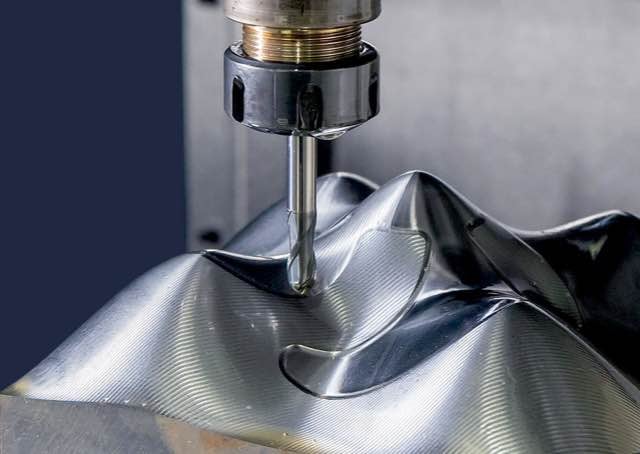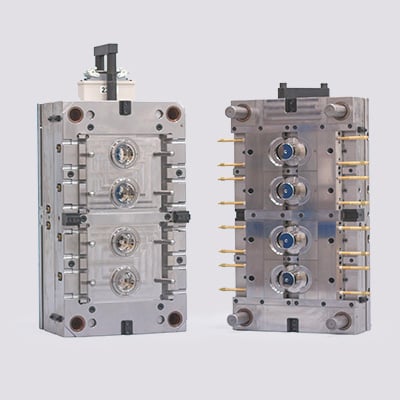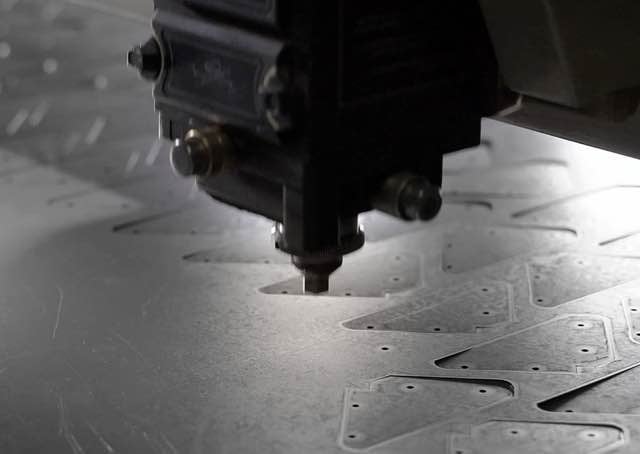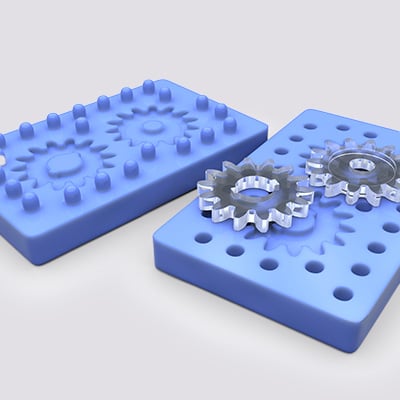
- Scalability is a key focus for companies of all sizes and industries today, along with offering intensive customization for many types of new industrial products.
- Customers may begin with 3D printing and then move to more traditional technologies, vice versa, or they may integrate a combination of technologies into their production processes.
- Shapeways works with each customer to figure out what materials and technology are best for their industrial production needs, continuing to evaluate manufacturing strategies periodically as volumes increase.
- Seven different global verified traditional manufacturing partners work with Shapeways to offer comprehensive end-to-end production.
3D Printing vs. Traditional Manufacturing—Making the Right Choices
Shapeways is a world leader in digital manufacturing, but also offers a wide range of other choices for making products that can be customized, made with precision, and produced accurately every single time. While additive manufacturing is beneficial in many industrial scenarios today—and increasingly, this includes the larger scale too—when innovation and extraordinary demand from the public converge, businesses must often turn to mass production to meet their ongoing goals for continued growth and success.
When is it Time to Turn to a Conventional Technique?
Despite the ongoing trend to move toward mass customization with additive manufacturing, traditional manufacturing still has an enormous hold over industrial production and may simply be the best choice for a specific product, or line of products being created on the large scale.
The goal for any business is to offer a quality product and then to grow over the years. Traditional methods of manufacturing allow Shapeways customers to leap forward while still relying on ongoing support from their manufacturing partner. Deciding when it is best to transition to conventional techniques can be tricky, and is a continued discussion between the Shapeways production team and customers who are in the enviable position of providing increased numbers of unique products to a growing base of customers.
Companies like 67 Designs are committed to 3D printing via Shapeways as long as possible because of the ongoing benefits such as durability and the quality of finish available through Selective Laser Sintering (SLS) technology with Nylon 12 [Versatile Plastic]; however, CEO Gavin Stener also has realistic expectations regarding a potential transition to injection molding for larger manufacturing volumes of his company’s high-end accessories.
Other customers like Quantum Systems have been using 3D printing since their inception. They have streamlined their processes by integrating 3D printing with other traditional manufacturing like injection molding and CNC machining, making high-performance drones that are capable of revolutionary services like flying medical samples to labs in minutes.
Find out more about these companies and their choices in manufacturing by downloading their case studies here.
CNC Machining

A traditional subtractive, or reductive, manufacturing process around since the late 1970s, Computer Numerical Control (CNC) machining is directed through computerized controls which cut or carve materials into geometrical shapes that eventually become industrial parts. After a CAD file is created, it is converted into language for CNC machining software instructions. The operator positions materials, machining tools are attached, and the manufacturing process begins.
Typical materials used with CNC machining for drilling, milling, and turning include metals like aluminum and steel, thermoplastics, nylons, and acrylics. High volumes can be manufactured to meet customer demands, maintaining accuracy and quality.
In comparison to additive manufacturing where structures are built by adding materials meticulously, layer by layer, subtractive processes basically revolve around beginning with a piece of material that is manipulated into the desired shape by cutting away from a piece of metal, for example. Parts are made quickly, accurately, with tight tolerances, good surface finishing, and minimal post-processing effort is required.
Injection Molding

Patented in the 1870s, injection molding is one of the most commonly known—and used—forms of traditional manufacturing for mass production. Parts are created as materials like metal, thermoplastics, and more are heated in molten liquid under pressure and then poured into custom molds. As the liquid material begins to solidify, the industrial structure begins to form, and is ready after cooling. Little post-processing is required.
Extremely prevalent, to the point of maintaining a presence in nearly every application, injection molded parts can be made in a versatile range of geometries, resulting in strong yet lightweight parts with excellent detail. Consistency is usually guaranteed, especially as the same molds can be used over and over. Little post-processing is required. Other advantages include great latitude in design, a wide range of materials and finishes to choose from, and overall efficiency, speed, and repeatability in production of large volumes—even in the millions.
Machine Tooling

Another versatile method that is also effective and streamlined for mass production of parts, machine tooling opens up a wide range of choices for businesses engaged in industrial manufacturing. Shapeways manufactures molds for making high-performance parts through conventional processes like injection molding, as well as offering machine tool molds to be purchased on their own. Tooling options can be designed to customers specifications, heavily customized, and produced in large volumes.
Providing a range of molds, from simple designs to those including complex details, undercuts, inserts, and more, they can be used repeatedly over the long-term with many different materials. Currently, Shapeways primarily offers aluminum and steel for machine tooling related to industrial applications.
Sheet Metal Fabrication

Using a wide range of metal materials to make critical industrial parts for industries like automotive and aerospace, sheet metal fabrication is comprised of many different processes. Used with materials like aluminum, stainless steel, copper, and more, sheet metal fabrication is used to make many commonly used products.
In forming, metal is shaped into a required structure through stamping, bending, and rolling. Cutting may include basic methods, the use of lasers, powerful water jetting, compressed gas, or machining with milling or drilling. Joining sheet metal relies on typical processes like welding, using bonding agents for adhesion, or connecting with embedded screws.
One of the most highly industrial forms of manufacturing—and often used for serious applications in construction, sheet metal fabrication is beneficial due to the lightweight yet durable nature of the materials, its ability to hold up in outdoor environments, and ease in repairs. The ability to form metal also leads to the production of many versatile, highly customized parts.
Urethane Casting

In urethane casting, multiple products can be manufactured in one silicone mold, to be filled with polyurethane. High-quality parts can be made in versatile large-volume production or on-demand, allowing businesses the advantages of decreasing the amount of standing inventory on-site, as well as eliminating the need for warehouse space altogether in some cases.
Shapeways 3D prints the silicone master patterns for molds, producing high-performance parts with industrial materials. The process is fast, efficient, and suitable for components being made on any scale. Parts can be over-molded combining two materials, used with inserts, and the sheet metal requires little post-processing work.
Vacuum Casting

Typically used to make small, intricate parts, vacuum casting is another versatile form of manufacturing offering enormous potential for low- to high-volume production of parts in varying textures. Silicon molds are used in this process, which is unique in relying on a vacuum chamber to pull liquid into molds where high-quality structures are formed, whether for models or functional, end-use parts.
Shapeways offers a wide range of materials for vacuum casting, whether they must possess flame-retardant qualities, or require flexibility or rigidity.
Making Mass Customization and Production on Any Level Available to All
The Shapeways mission continues to revolve around making 3D printing accessible for everyone, offering resources like advanced technology and materials to other companies not currently ready to invest in highly industrial machines. Shapeways provides expertise in mass customization and mass production, promising the same level of service and quality as companies transition into using other manufacturing methods. In the end, businesses are able to grow and distribute their products with an improved flow in the supply chain and a focus on greater efficiency.
“So many companies working with Shapeways today have grown with us throughout the years—from making prototypes and small numbers of customized products to evolving into thriving businesses exploring a variety of different technologies and materials as demand has continued to grow,” said Miko Levy, Shapeways CRO. “While they may have started out with 3D printing and are still using that technology for many products, our job as a long-term manufacturing partner is to direct them to the most suitable and efficient forms of production.”
About Shapeways
Enjoy the benefits of advanced technology and a wide range of materials from Shapeways for manufacturing parts with accuracy, complex detail, and no minimum or limits in terms of mass customization or single part orders. Read about case studies, find out more about Shapeways solutions, and get instant quotes here.


